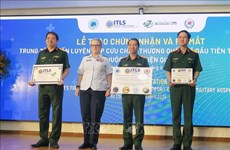High time to invest in scaling up HPV vaccination: study
Comprehensive investment in vaccinations against human papillomavirus (HPV) and cervical cancer screening and treatment can yield substantial socio-economic returns and eliminate the disease in Vietnam.
 Representatives attend the conference declaring key findings of the Investment Case Study on HPV Vaccination in Vietnam (Photo: VNA)
Representatives attend the conference declaring key findings of the Investment Case Study on HPV Vaccination in Vietnam (Photo: VNA)This is the conclusion of the Investment Case Study on HPV Vaccination in Vietnam, which was announced in Hanoi on May 10.
The study was undertaken by the United Nations Population Fund (UNFPA) in collaboration with the National Institute of Hygiene and Epidemiology (NIHE) under the Ministry of Health and Victoria University and Daffodil Institute in Australia.
Cervical cancer caused by HPV is a major public health concern worldwide, including in Vietnam. In 2018, cervical cancer was the sixth most common cancer among Vietnamese women, with nearly 4,200 new cases and 2,420 deaths.
In Vietnam, the HPV vaccination and cervical cancer screening rates are low.
The Sustainable Development Goals (SDGs) Survey on Women and Children, which was conducted by the General Statistics Office in 2021 with support from UNFPA and UNICEF, showed that only 12% of women and girls aged 15-29 are vaccinated and only 28% of women aged 30-49 have been screened so far.
The study reveals that it is possible that Vietnam can eliminate cervical cancer in the next 30 years if HPV vaccination is scaled up to cover 90% of adolescent girls, 70% of women receive HPV-based screening, and 90% of women with pre-cancer and invasive cervical cancer receive adequate treatment.
The comprehensive combination of HPV vaccination, screening and treatment could eliminate cervical cancer in the country 29 years earlier than only HPV vaccination intervention.
The study estimates that one dollar invested in cervical cancer prevention programmes can return between 5-11 USD in terms of economic benefits and between 8-20 USD when economic and social benefits are combined.
Naomi Kitahara, the UNFPA Representative for Vietnam, said: “UNFPA recommends the Government of Vietnam rolling out HPV vaccination for adolescent girls and cervical cancer screening and treatment for women. With the government's approval, provinces with good income can start rolling out the HPV vaccination programme using the provincial budget before it is included in the National Expanded Immunisation Programme in 2026.”
“UNFPA is fully committed to supporting the Government of Vietnam and its partners in rolling out HPV vaccination in the country,” she said.
Associate professor Duong Thi Hong, deputy director of the NIHE, said: “The study provides strong evidence on the cost-effectiveness and the return of-investment as well as the estimated timeline for cervical cancer elimination in Vietnam. This scientific evidence is worthwhile for the Government to consider for allocating required resources to develop optimal strategies on cervical cancer prevention and control.”./.













